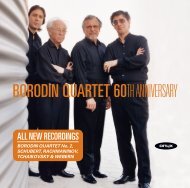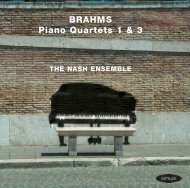Untitled - Onyx Classics
Untitled - Onyx Classics
Untitled - Onyx Classics
- No tags were found...
Create successful ePaper yourself
Turn your PDF publications into a flip-book with our unique Google optimized e-Paper software.
expression to this mighty struggle in the harmonic clashes at ‘Ich peitsche die Wellen mit mächtigemSchlag’ (‘I lash the waves with powerful strokes’) and at the same point in each subsequent verse.He pits the marcato bass octaves against the rapid, flowing semiquavers, and we seem to see the boat’sprow scatter the spray heavenward. Fahrt zum Hades is one of Schubert’s finest songs of death,characterised by repeated quaver triplets in the right hand, and a powerful descending bass line in theleft. Though the song moves from aria to recitative to arioso, Schubert provides a unity by repeatingthe first verse at the end. Auf der Donau reflects Mayrhofer’s basic pessimism, and anyone familiarwith the poet’s despondent nature will not be fooled by the tranquil barcarolle with which Schubertbegins the song; by verse two it has become a much more sinister affair, with the sort of eerie bass trillsthat foreshadow those of the B flat piano sonata. Here they denote impending doom, and thisremarkable song ends with twelve bars that echo to the single word ‘Untergang’ – ‘destruction’.Schubert set only 14 of Mayrhofer’s 36 lines in Erlafsee, ignoring the philosophical stanzas, andconcentrating instead on the ones that describe the beauty of the scene and its effect on the poet’ssoul. With its refrain (‘Mir ist so wohl, so weh’), ‘Erlafsee’ is almost a summation of Romantic longing,the Sehnsucht that suffuses so many of Schubert’s songs.Mayrhofer, though he worked as a book censor, was a man of liberal democratic views – no easy matterin Metternich’s repressive Vienna. The much-loathed Metternich’s nickname was ‘Mitternacht’, andwhen dissidents were executed, a bell was rung from San Marco – it was called the ‘Renghiera’ – twelvetimes to denote the macabre event, thus dispelling the radicals’ dream of liberty. Schubert setsMayrhofer’s Gondelfahrer as a sensuous 6/8 serenade, and in the bass 12 rolled A flat major chordscan be heard, as the campanile of St Mark’s strikes midnight. Rückweg also refers to the oppressivenature of Metternich’s Vienna, and Schubert sets this disillusioned poem to a fittingly plaintive 6/8melody in D minor. Am Strome, like ‘Auf der Donau’, treats the river as a symbol for human life, butalthough Mayrhofer’s poem ends in typically pessimistic mode, there is a sweetness about the musicthat makes this one of the more gentle Mayrhofer songs.Two other German poets are represented on this CD: Johann Wolfgang von Goethe and FriedrichSchiller, two of the greatest figures in German literature. Goethe’s Meeresstille was written in 1795 and















